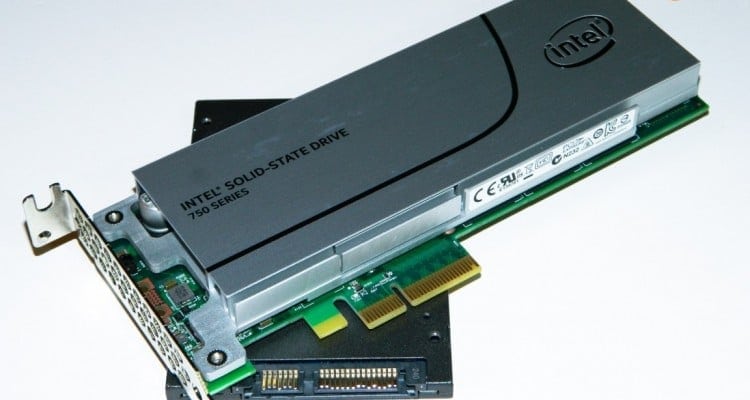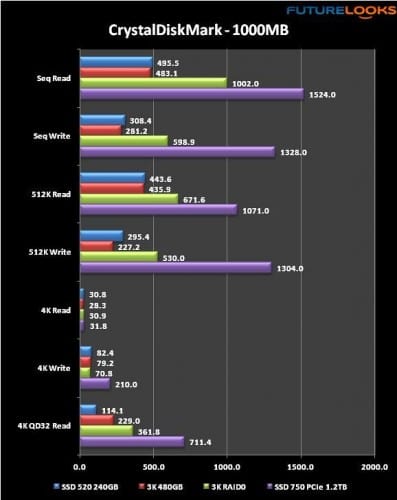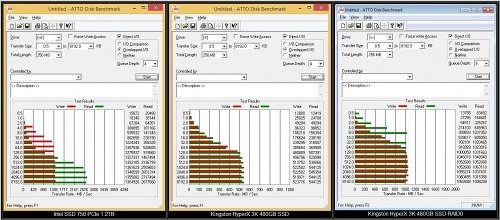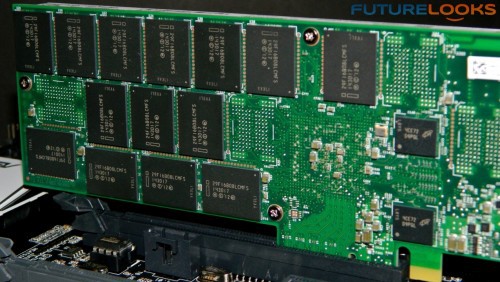- Superb bandwidth and performance
- Very easy to setup and manage
- Highly compatible
- Premium Price
- No current plans for less expensive solutions
Performance Benchmarks
To better understand the Intel’s SSD 750 series PCIe’s performance, we used a number of benchmarks including, CrystalDiskMark, ATTO, AS SSD Benchmark and a copy/paste time trial using a 12GB VM, to give you an overall idea of performance. RAID0 SSD results, using two HyperX 480GB SSDs, were included in CDM and ATTO benchmarks, giving you an idea of what the fastest conventional 2.5 inch SSDs, in their fastest configuration, can do against a component like this.
CrystalDiskMark 3.0.4
Despite CDM’s crushing compression tests, the Intel SSD 750 PCIe 1.2TB performs more like a RAID0 array with four 2.5 inch SSDs, crushing our two drive RAID 0 setup.
ATTO – Disk Benchmark
Don’t let ATTO’s bar colors or shapes fool you. If you look at the IO numbers, the Intel SSD 750 PCIe kicks out noteworthy write IO but also impressive read IO.
AS SSD Benchmark
Taking things back to basics, here we see the Intel SSD 750 PCIe 1.2TB against a single 2.5″ Kingston HyperX 3K 480GB SSD. The SSD 750 is about 4 times higher in sequential performance. Also, note the Access Time. In the human mind, .018 ms versus .191 ms is incomprehensible. But in computer calculations, that’s a drastic difference as a computer can accomplish a lot in that time frame. It’s almost not fair.
SSD File Copy Test
With some data to weight down the SSDs, I created 12GB VMs, and copied from one to the other. Once the buffers fill up, speeds always come down. However, the Intel SSD 750 PCIe held higher sustained transfer rates making quick work of each task. In contrast, it would take quad 480GB SSDs in RAID0 to get to that same kind of performance. However, you are adding a level of risk when working with so many drives. When one drive fails in RAID 0, your data is gone. Not to mention, all the extra space, and cable management required, to tidy that up.
Final Thoughts
The Intel SSD 750 PCIe 1.2TB in a word, would be speed. It’s a PCIe SSD capable of making excellent use of the PCI Express bus where all the bandwidth is readily available. In fact, it’s essentially RAID 0 on a card using one volume. That bandwidth reached as high as 1.6 GB/s for several seconds for certain tests, and maintained a strong 800+ MB/s in many other loaded transfer tests. In fact, it finally took four or five enterprise level Kingston E50 SSDs in RAID0, to match its performance, offline.
The positioning of the Intel SSD 750 PCIe 1.2TB is a rather unique one at the moment. There are limited options currently available and many carry high price tags inherited by their enterprise pedigrees. Intel’s own P3600s costs $2400 to $2600 for similar capacities, while the SSD 750 PCIe will only set you back around $1000 US, depending on the retailer. For regular desktop users or gamers, that’s a pretty penny. However, at around a buck a GB, that’s in line with premium 2.5 inch SSDs, and you’re getting a ton more performance, in a smaller package.
As it stands, the Intel SSD 750 PCIe 1.2TB is the fastest workstation, quasi-enterprise PCIe NVMe SSD available that doesn’t carry an enterprise price. It’s still expensive by mainstream consumer standards, but the price shouldn’t deter if you want that enterprise level performance, at a pro-sumer price. It’s definitely a “high performance” piece of gear.

Help Us Improve Our Reviews By Leaving a Comment Below!






